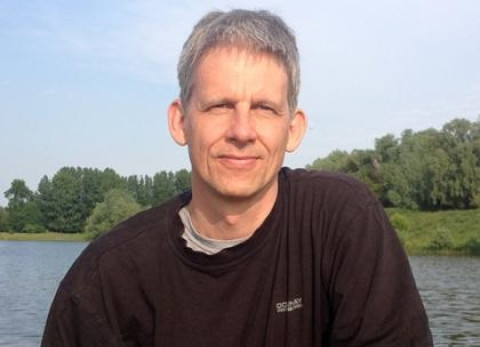Steven Declerck appointed professor at KU Leuven

Steven Declerck appointed professor at KU Leuven
From 1 October, the Belgian university KU Leuven has appointed Steven Declerck as professor at the Department of Biology. Steven Declerck is an aquatic ecologist at the Netherlands Institute of Ecology (NIOO-KNAW), where his research focuses on the ability of zooplankton to adapt to environmental changes. In this interview, Declerck talks about his career and field of research.
Can you talk about your career so far?
‘I am of Belgian nationality but have been living in the Netherlands for 14 years now. I was trained as a biologist, studied and obtained my PhD at Ghent University. I then started working as a researcher at KU Leuven, where I started as a scientific associate and then worked as a postdoctoral researcher. In 2008, I won a travel grant for a year of research at the University of British Columbia (Vancouver, Canada). In 2010, I was hired by NIOO in a tenure track position, after which I was appointed senior researcher in 2015. Since 2017, I have also returned to KU Leuven, first as a part-time visiting professor for a year, then as a part-time Associate Professor for five years, and since October this year as a part-time Professor.’
What is the focus of your research?
‘During my career as an aquatic ecologist, I have done extensive research on how human-induced environmental changes affect the biodiversity and functioning of freshwater systems, both at a local and regional scale. In recent years, I have become strongly interested in the ability of freshwater zooplankton to rapidly adapt their genetics, and what the ecological consequences of this ability are. Several experiments in my group have shown a stunning ability of zooplankton to rapidly adapt to increasing levels of environmental stresses, such as low food quality, salinisation, heat and elevated amounts of metals. However, there are limits to this ability, and genetic adaptations may also affect the genetic diversity and future evolutionary ability of these organisms, and how they subsequently cope with other stressors. For example, we have shown that rapid adaptation of rotifers to a warm environment greatly increases their ability to cope with metal toxicity, while the reverse effect does not occur.’
Why is it important this research is being done?
‘Nature is changing significantly through human activity, and populations of wild organisms are increasingly facing new threats due to climate change, pollution, and habitat fragmentation and destruction, among other reasons. Whether certain species can continue to thrive is strongly determined by their ability to adapt to changing conditions in time. Rapid evolutionary adaptation can also lead to a variety of changes in the characteristics with which species interact with their environment. This, in turn, can have consequences not only for biodiversity, but also for how ecosystems these species are part of are functioning. And this functioning provides the services that ecosystems contribute to human society daily. In my opinion, too many ecologists still underestimate the importance of this.
One could say that the ecological consequences of human-induced changes in nature will never be fully understood or predicted if micro-evolutionary dynamics are not taken into account. Of course, the relative importance of rapid evolution depends heavily on the organism, system and time scale. It is therefore an important challenge to quickly gain a better understanding of the conditions under which rapid evolution may or may not make a significant difference.’
What does the new appointment as professor at KU Leuven mean to you?
‘I view my appointment as professor as a culmination of my research career and an appreciation of the teaching efforts I have made at KU Leuven in recent years. The appointment at KU Leuven gives me the opportunity to contribute to the education of the next generations of biologists, a very important task considering the ecological challenges facing our society now and in the near future. Furthermore, the appointment promotes the exchange of ideas and cooperation between NIOO and researchers at KU Leuven.’
What are your plans for the near future?
‘I would like to find out how generally applicable our results are. We now know that adaptation of populations to stressors can strongly determine how well they cope with other stressors. However, we do not yet know very well whether there are general principles by which we can predict these interactions. In addition, I want to delve deeper into how adaptation affects genetic diversity and thus future evolutionary potential. Another intriguing idea is that populations do not evolve individually, but simultaneously in the context of a community with other species. Species living within a community may differ in their micro-evolutionary potential, and at the same time they may influence each other's micro-evolutionary trajectories through ecological interactions. I think it would be particularly interesting to explore the extent to which these layers of complexity determine how entire communities respond to anthropogenic change.’

